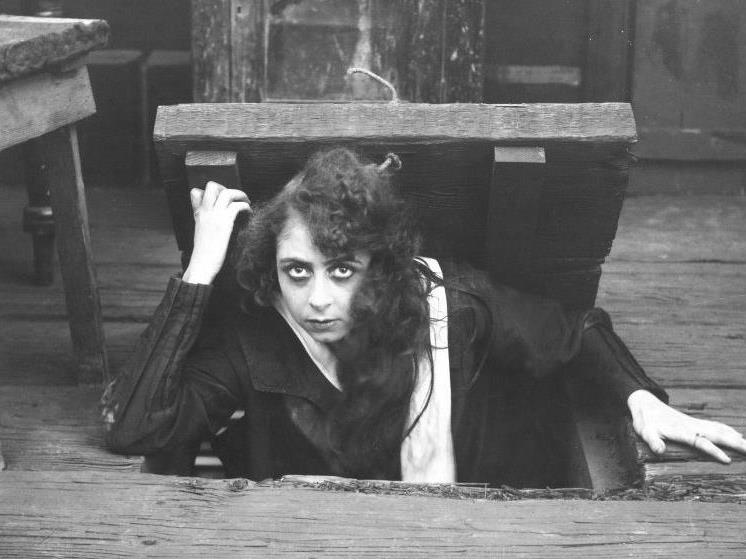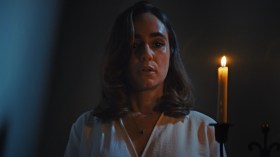Image: ‘Let us out of the box!’ say perpetually emerging Australian female filmmakers. Lottie Lyell in The Church and the Woman (1917).
Australia’s first film star, Lottie Lyell, liked to perform her own stunts, including riding a horse with a knife between her teeth, and diving into the sea. But as anyone who’s ever tried to make a film will sympathise, her most daring feats of bravery and ingenuity were often required behind the scenes. Partnered in work and life with Raymond Longford (they scandalously never married, though they’re now buried in the same grave), the pioneering actor, writer, director, producer and editor made 28 films before she died in 1925 at the age of 35.
As a silent screen star, we never heard Lottie Lyell’s voice and she often worked uncredited. But her contributions continue to emerge and astonish as historians dig around to renovate the reputations of forgotten women in film.
It makes sense on a number of levels that the South Australian Film Corporation (SAFC) has decided to honor Lottie Lyell with a new award for female screen practitioners working in the state. Announced this week, the annual $20,000 Lottie Lyell Award is open for applications now, until COB Monday 24 September 2018. The recipient will be announced at the upcoming Adelaide Film Festival (10 – 21 October) on their glitzy awards night.
The idea for the Lottie Lyell Award came to Courtney Gibson, the SAFC’s Chief Executive Officer, earlier this year when she was dealing with far more prosaic issues. As Gibson told Screenhub by email:
There was a moment back in March when it looked as though the Adelaide Studios may have to change its street address by name, from 1 Mulberry Lane, to something else entirely. I wondered if Lottie Lyell Lane would be an apposite address and as I researched Lottie’s relationship to South Australia, I realised it was the Centenary year of the founding of Lottie and Ray Longford’s production company in SA, The Southern Cross Feature Film Company. By April, when I started the role, we had an assurance from council our street name need not change, but by then we were wedded to the idea of doing something in Lottie’s name and the idea was hatched.
The Southern Cross Feature Film Co made The Woman Suffers – regarded as Australia’s first feminist film, exactly 100 years ago, and just one year before their most famous collaboration, and Australia’s most successful film of the time, The Sentimental Bloke in 1919.
Judging the submissions and deciding the inaugural winner in 2018 will be Gibson, along with Adelaide Film Festival CEO/Artistic Director Amanda Duthie, and filmmaker Gillian Armstrong who, like Lottie, was a trailblazer in South Australia, making her first documentary there for SAFC with Smoke and Lollies in 1974. A portrait of Lottie Lyell will also be hanging during the festival at SAMSTAG as part of ‘Starstruck’, an exhibition of photos of Australian actors originally held at the National Portrait Gallery.
So what kinds of people or projects should apply for the Lottie Lyell Award? The field is pretty open as long as you’re female, or female identifying, and you live in South Australia, though it would seem to favour writers, directors and producers.
As Gibson wrote, ‘Lottie was a multi-skilled creative who moved with purpose from stage to screen… Always pushing out into new territory, she was a proper pioneer. An award like this is an open invitation for female practitioners to stake their claim to $20k to fund the development, or making, or finishing, of a passion project, and it can be for any work designed for the medium of screen. With women still under-represented in key creative roles across the industry, the Lottie Lyell Award is a useful tool for identifying and enabling new work by latter-day Lotties.’
In other female-focused award news, the $20,000 Natalie Miller Fellowship is currently open for applications until Monday 20th August at 5pm, 2018.
Established in 2011 to recognise the contribution of screen industry pioneer, the cinema owner and distributor Natalie Miller AO, the Fellowship is less about making actual films, and more about supporting women in the broader screen industry to develop leadership skills and contacts.
The Natalie Miller Fellowship offers financial assistance to an individual woman to pursue professional development attachments, internships, secondments and travel. Last month at the Movie Convention on the Gold Coast, Village Roadshow was announced as a co-sponsor of the Fellowship, pledging $50,000 over the next five years.
Since 2012, six fellowships have been awarded: Rachel Okine (Vice President of Acquisitions STX international), Harriet Pike (Head of Production & Development, WildBear Entertainment), Rebecca Hammond (Head of Localisation & Access Services, Deluxe Australia), Courtney Botfield (Film Distribution and Marketing Consultant/Producer), Sasha Close (Film Programming Manager, Wallis Cinemas) and Kristy Matheson (Kristy Matheson (Director, Film Programs ACMI).
The recipient of the 2018 Natalie Miller Fellowship will be announced in November 2018 at the SPA Screen Forever Conference at the Crown Casino In Melbourne (20 – 22 November).
The women behind the fellowship are a veritable powerhouse of acting, filmmaking and publicity talent. They currently include Sue Maslin as President, Sandra Sdraulig AM as VP, Carol Schwartz AM and Claudia Karvan as Patrons, and Kerry Gardner and Jennifer Peedom as Ambassadors.
$20,000 may not be a great deal of money, but the sisterhood behind both the Lottie Lyell Award and the Natalie Miller Fellowship represent real clout. Together with other initiatives striving to correct the gender imbalance, these are largely symbolic.
Like power itself.





